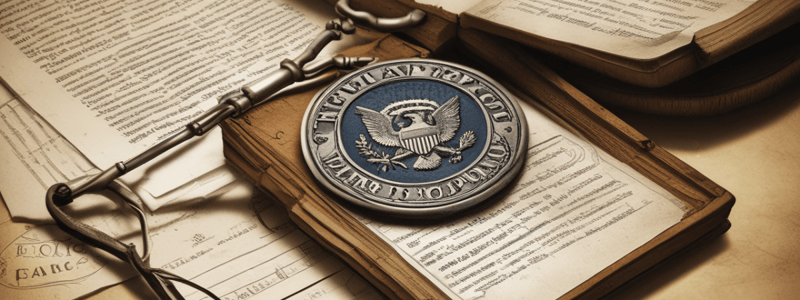Podcast
Questions and Answers
What must a Crown attorney prove in court?
What must a Crown attorney prove in court?
- The identity of the accused (correct)
- The identity of the victim
- The motive behind the offense
- The location of the crime
Which of the following is NOT an objective of an investigation?
Which of the following is NOT an objective of an investigation?
- To gather all evidence, both for and against the accused
- To establish grounds for arrest and laying charges
- To prove the 'facts in issue'
- To manipulate evidence to favor the accused (correct)
What is the purpose of using 'John and Jane Doe' in investigations?
What is the purpose of using 'John and Jane Doe' in investigations?
- To provide incorrect information to suspects
- To identify unknown subjects or victims (correct)
- To confuse the suspects
- To protect the identity of victims
What is a common misconception related to tunnel vision in investigations?
What is a common misconception related to tunnel vision in investigations?
Why is it important to prove the 'facts in issue' during an investigation?
Why is it important to prove the 'facts in issue' during an investigation?
What should police officers do within 24 hours of making an arrest?
What should police officers do within 24 hours of making an arrest?
What is the Latin term for 'guilty act', which refers to an act prohibited by law?
What is the Latin term for 'guilty act', which refers to an act prohibited by law?
What type of reasoning involves theory development and observation of instances or experiments to test a hypothesis?
What type of reasoning involves theory development and observation of instances or experiments to test a hypothesis?
What is the Latin term for 'guilty mind', which refers to the required degree of criminal intent?
What is the Latin term for 'guilty mind', which refers to the required degree of criminal intent?
What is a potential issue with the Uniform Crime Report (UCR) as a source of crime statistics?
What is a potential issue with the Uniform Crime Report (UCR) as a source of crime statistics?
What type of intent is typically required for the crime of unlawfully causing bodily harm or manslaughter?
What type of intent is typically required for the crime of unlawfully causing bodily harm or manslaughter?
What is the term for the process of forming a conclusion based on the analysis of findings and event reconstruction in an investigation?
What is the term for the process of forming a conclusion based on the analysis of findings and event reconstruction in an investigation?
What percentage of homicides were committed by strangers?
What percentage of homicides were committed by strangers?
Who is considered a person of interest in an investigation?
Who is considered a person of interest in an investigation?
What is the definition of 'reasonable grounds'?
What is the definition of 'reasonable grounds'?
What are the factors that cause investigations to fail?
What are the factors that cause investigations to fail?
What are the qualities of a good investigator?
What are the qualities of a good investigator?
What is the significance of the victim-offender relationship in a homicide investigation?
What is the significance of the victim-offender relationship in a homicide investigation?
What is the difference between a victim and a witness in a crime investigation?
What is the difference between a victim and a witness in a crime investigation?
What is the purpose of gathering evidence in a crime investigation?
What is the purpose of gathering evidence in a crime investigation?
What is the definition of a suspect in a crime investigation?
What is the definition of a suspect in a crime investigation?
What is the difference between a person of interest and a suspect in a crime investigation?
What is the difference between a person of interest and a suspect in a crime investigation?
Flashcards are hidden until you start studying
Study Notes
Types of Law
- Federal law, Common law, and Case law are essential for an investigator.
Investigation
- An investigation is an official examination into the circumstances of an event, incident, or situation.
- It may reveal that no actual event or wrongdoing ever occurred.
- The objective is to seek the truth, gathering all evidence and relevant information using lawful methods.
Facts in Issue
- Who, what, where, when, and how are the elements of an offense.
- Facts in issue are found in the relevant section of statute law.
Types of Police Investigations
- Known or alleged violation of statute law
- Planned (information received from an informant about a crime)
- Intended crime (e.g., suspicious vehicle parked in front of an empty house)
- Proactive (being productive to prevent crimes)
- Reactive investigations (reacting to a specific crime that has happened)
Identity of Involved Offender(s)
- Identity can be proven through name, date of birth, address, driver's license, physical appearance, and social media.
- John and Jane Doe are commonly used when the names of subjects or victims are unknown.
Crown Attorney's Role
- The Crown attorney must prove the identity of the accused in court.
- Establish grounds upon which to effect arrest, lay charge(s), or further the investigation.
Tunnel Vision
- Definition: A single-minded and overly narrow focus on a particular investigative or prosecutorial theory.
- Cure: Have an open mind, and consider every point of view.
Mens Rea and Actus Reus
- Mens Rea: L. = guilty mind, required degree of criminal intent.
- Actus Reus: L. = guilty act, an act prohibited by law.
Investigative Process
- Gathering of Information: Take statements, identify the suspect, and collect evidence.
- Reconstruction of Events: Analyze findings and form a conclusion.
- Inductive vs. deductive reasoning:
- Inductive Reasoning: Involves theory development and observation.
- Deductive Reasoning: Involves logical inference, event reconstruction, and application of forensic science.
Motives for Crimes
- Greed / Gain: Theft, robbery, arson, fraud, murder, kidnapping, drug-trafficking, etc.
- Revenge: Assault, murder, threatening, mischief to property, etc.
- Sex: Sexual assault, child sexual offenses, trespassing by night, etc.
- Mental Disorder: Apparently motiveless crimes
Categories of Crimes
- Known Offender Crimes: More common and easier to investigate.
- Unknown Offender Crimes: More difficult to investigate.
Victim-Offender Relationship
- 84% of homicides were committed by acquaintances of the victim.
- 45% of homicides were committed by family members and relatives.
- 16% of homicides were committed by strangers.
Elimination of Persons of Interest
- Statistical probability suggests initial investigation should focus on those closest to the victim or scene.
- Eliminate family, relatives, acquaintances, and strangers simultaneously.
Victims and Witnesses
- Victim: Any person against whom a crime is committed.
- Witness: Any person who has relevant knowledge of events under investigation.
- All victims are witnesses, but not vice-versa.
Persons of Interest and Suspects
- Person of Interest: A person whose background, relationship, or opportunity to commit the offense warrants further inquiry.
- Suspect: A person linked to the crime by some incriminating evidence.
Reasonable Grounds
- Defined: A set of facts or circumstances that, if true, would lead an ordinary, prudent, and cautious individual to have a strong belief.
- Reasonable Grounds: Subjective Belief (officer's mind) and Objective Belief (independent person).
Factors that Cause Investigations to Fail
- Unclear goals and objectives
- Inadequate resources
- Unclear or non-existent chain of command
- Haphazard approach
- Failure to follow-up leads
- Failure to exhaust all avenues of investigation
- Terminating investigation before objectives achieved
Requirements of an Investigator
- Knowledge of statute and case law
- Knowledge of investigative techniques and best practices
- Training and experience
- Ability to apply law and investigative methodology
- Correct technique(s) in the correct sequence to achieve the highest probability of success
Qualities of an Investigator
- Motivation
- Attention to detail
- Common sense and good judgment
- Decisiveness
- Perseverance
- Sincerity
- Empathy
Studying That Suits You
Use AI to generate personalized quizzes and flashcards to suit your learning preferences.



